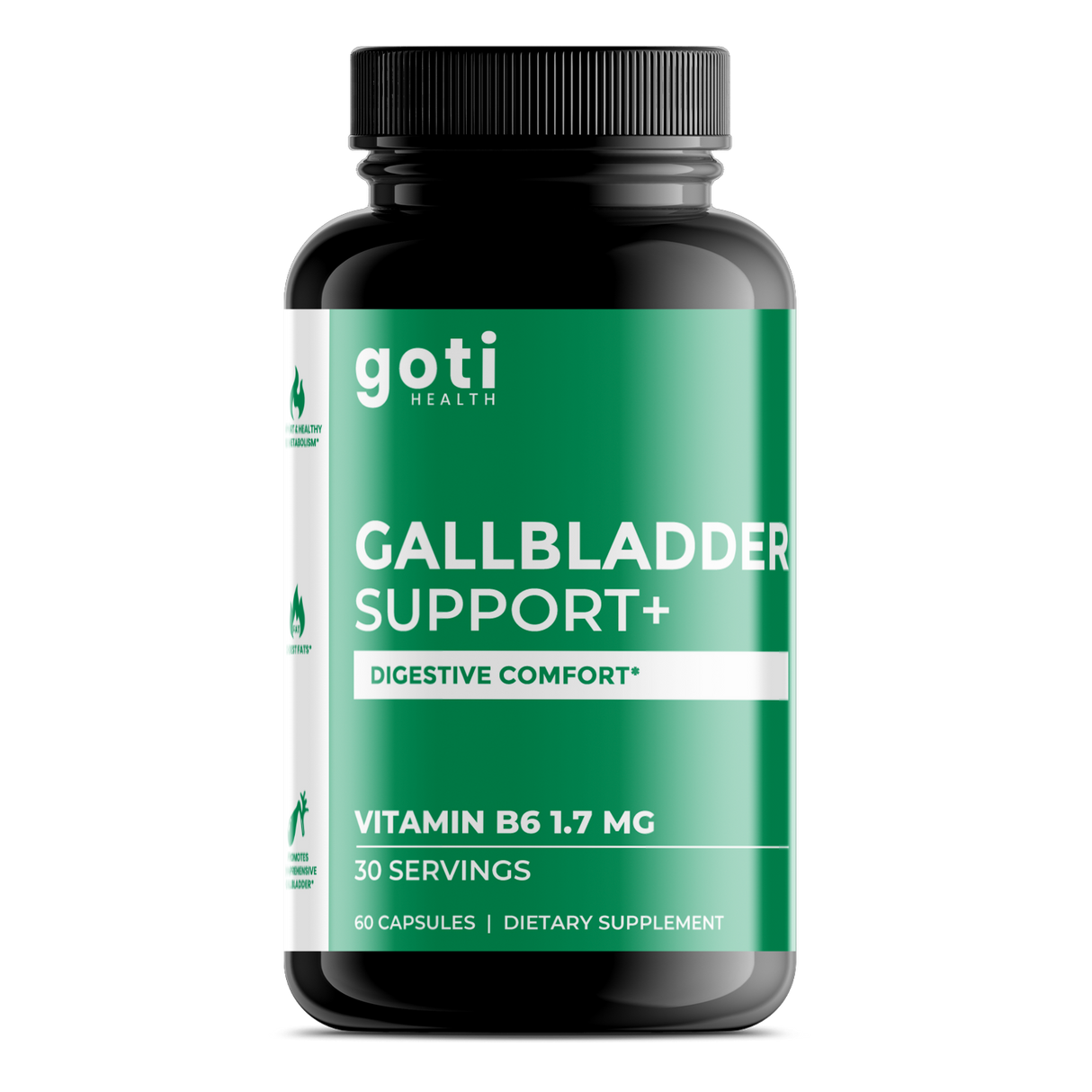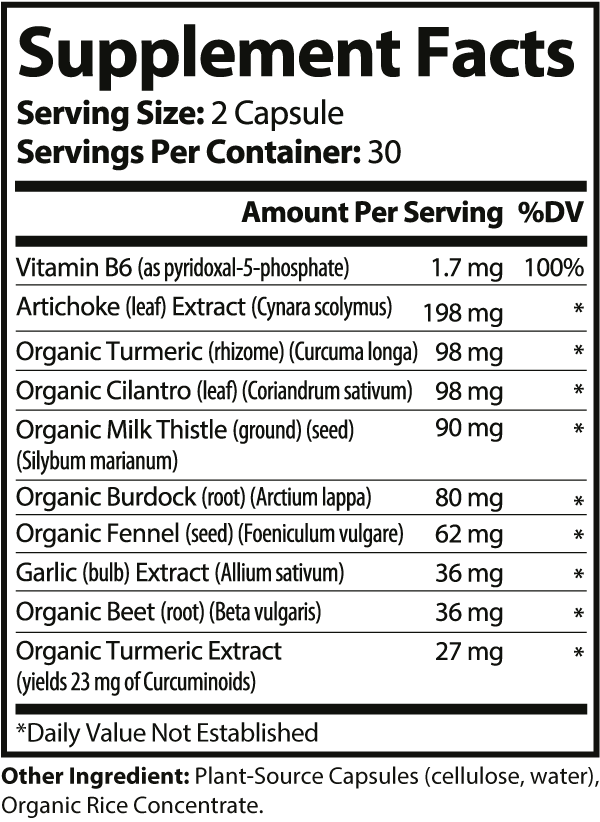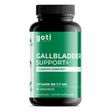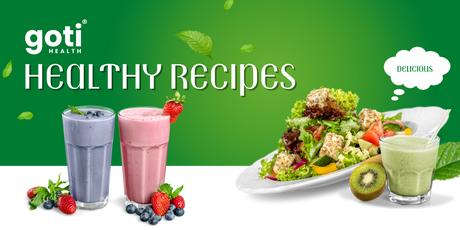Gallbladder Support+ Capsules
Gallbladder Support+ Capsules is backordered and will ship as soon as it is back in stock.

|
Formula Purposes & Benefits |
|
Gallbladder Support+ is developed based on cutting-edge scientific research and expert formulation to support healthy detoxification, healthy bile metabolism, healthy gallbladder support, and promote normal gallbladder contraction and bile flow. Our world class bile and gallbladder support product utilizes a unique blend of artichoke leaf extract, turmeric, and garlic bulb extract in a highly bioavailable and herbal anti-inflammatory support product! Our formula is proudly made in the USA in an FDA registered facility, following Good Manufacturing Practices (GMP) standards. Our commitment to excellence is reflected in the fact that only 4% of the supplements on the market can match our world-class standards. |
|
Formula Ingredient Deck |
Benefits Of Each Ingredient |
|
Artichoke (leaf) Extract
|
● Supports digestive health, influencing lipid metabolism, and regulates glucose and insulin levels (268,269). |
|
Organic Turmeric |
● May support antioxidant, cardio-protective, anti-inflammatory, anti-microbial, nephro-protective, hepato-protective, immunomodulatory, and anti-rheumatic effects (123). ● May reduce inflammation via decreases of inflammatory markers such as c-reactive protein, interleukin 6, tumor necrosis factor, and decreased cytokine production (123). ● May support joint health via decreases in connective tissue inflammation and improved pain in individuals with osteoarthritis (122). ● May support blood sugar regulation via increased pancreatic beta cell function and improved insulin sensitivity (121). ● May support cardiovascular and liver health via reduced accumulation of advanced glycation end products (AGE), reduced lipid peroxidation, and improved vascular function. ● Curcumin may exhibit antioxidant activity via scavenging of superoxide anion (∙O2−∙) and hydroxyl radicals (∙OH) (scavenging of inflammation molecules) (118,119). ● Curcumin may modulate breast carcinogenesis through its effect on cell cycle and proliferation, apoptosis, senescence, cancer spread and angiogenesis (119). ● May target cancer growth pathways such as the NFkB, PI3K/Akt/mTOR, MAPK and JAK/STAT, (119). |
|
Organic Milk Thistle |
● May support liver health, aids as antioxidants, and reduces inflammation (345). ● May support liver health via high amounts of Silymarin which reduces lipid peroxidation and inhibits binding of toxins to the hepatocyte cell membrane receptors (345). |
|
Organic Burdock Root |
● May support healthy detoxification, cardiovascular health, skin health, and immune health (356). ● May support immune health through its high levels of antioxidants, polyphenols, and flavonoids, which enhance the adaptive/innate immune response (356). ● May support cardiovascular and skin health by promoting enhanced blood circulation to the skin surface, improving skin quality, and potentially combating skin diseases (356). ● May support antioxidant function through the presence of antioxidant and antidiabetic compounds found in the root, which possess anti-inflammatory effects and potent inhibitory effects that may inhibit malignant growth (356). |
|
Garlic Bulb Extract |
● May support cardiovascular health, immune health, joint health, reduced inflammation, gut health, and enhanced antibacterial activity (161). ● May support cardiovascular health via reduced hypertension, reduced total cholesterol, reduced arterial stiffness (hardening of arteries), and markers of atherosclerosis (161). ● May support joint health via reduced NF-κB activation (inflammation) in human fibroblast cells and reduced prevalence of pain in individuals with rheumatoid arthritis (162). ● May support gut health via increased prebiotic properties, increased microbiome population, and increased Lactobacillus and Clostridia species (163). ● May support immune health via a reduction in inflammatory markers (CRP, TNF, IL-6) (164). |
|
Organic Beet Root |
● May support cardiovascular, immune health, reduced blood pressure, and optimizes exercise performance (87). ● High in antioxidants such as ascorbic acid, carotenoids, phenolic acids, flavonoids, polyphenols, and anti-inflammatory compounds (betalains) (87). ● Betalains have been shown to inhibit inflammatory pathways (Nuclear Factor-Kappa B “NF-κB”) that manifest in a plethora of chronic diseases (87). ● Increases nitric oxide production optimizing healthy blood pressure and enhanced cardiovascular output during exercise (87). ● Beetroot may support anti-carcinogenic activity by possibly inhibiting cancer cell growth mechanisms (cell proliferation, angiogenesis, and tumorigenesis) (87). |
|
Organic Fennel Seed |
● May support joint health via decreased prevalence of intense arthritic symptoms (390). |
|
Proper Use of This Supplement |
|
|
Our Formula Vs Other Formulas on the Market.
|
|
|
|
1. Our formula is GMP certified and made in an FDA registered facility. |
1. Source cheap ingredients from heavily polluted soils. |
|
2. High quality herbal gallbladder support formula in a bioavailable and efficaciously dosed formula. |
2. Uses cheap synthetic nutraceuticals that may have heavy metals due to poor product quality and fillers. |
Sources:
- Clifford, T., Howatson, G., West, D. J., & Stevenson, E. J. (2015). The potential benefits of red beetroot supplementation in health and disease. Nutrients, 7(4), 2801–2822. https://doi.org/10.3390/nu7042801
- Chilelli, N. C., Ragazzi, E., Valentini, R., Cosma, C., Ferraresso, S., Lapolla, A., & Sartore, G. (2016). Curcumin and Boswellia serrata Modulate the Glyco-Oxidative Status and Lipo-Oxidation in Master Athletes. Nutrients, 8(11), 745. https://doi.org/10.3390/nu8110745
- Barzegar, A., & Moosavi-Movahedi, A. A. (2011). Intracellular ROS protection efficiency and free radical-scavenging activity of curcumin. PloS one, 6(10), e26012. https://doi.org/10.1371/journal.pone.0026012
- Banik, U., Parasuraman, S., Adhikary, A. K., & Othman, N. H. (2017). Curcumin: the spicy modulator of breast carcinogenesis. Journal of experimental & clinical cancer research : CR, 36(1), 98. https://doi.org/10.1186/s13046-017-0566-5
- Suhett, L. G., de Miranda Monteiro Santos, R., Silveira, B., Leal, A., de Brito, A., de Novaes, J. F., & Lucia, C. (2021). Effects of curcumin supplementation on sport and physical exercise: a systematic review. Critical reviews in food science and nutrition, 61(6), 946–958. https://doi.org/10.1080/10408398.2020.1749025
- Pivari, F., Mingione, A., Brasacchio, C., & Soldati, L. (2019). Curcumin and Type 2 Diabetes Mellitus: Prevention and Treatment. Nutrients, 11(8), 1837. https://doi.org/10.3390/nu11081837
- Ashtary-Larky, D., Rezaei Kelishadi, M., Bagheri, R., Moosavian, S. P., Wong, A., Davoodi, S. H., Khalili, P., Dutheil, F., Suzuki, K., & Asbaghi, O. (2021). The Effects of Nano-Curcumin Supplementation on Risk Factors for Cardiovascular Disease: A GRADE-Assessed Systematic Review and Meta-Analysis of Clinical Trials. Antioxidants (Basel, Switzerland), 10(7), 1015. https://doi.org/10.3390/antiox10071015
- Mata, I., Mata, S., Menezes, R., Faccioli, L. S., Bandeira, K. K., & Bosco, S. (2020). Benefits of turmeric supplementation for skin health in chronic diseases: a systematic review. Critical reviews in food science and nutrition, 1–15. Advance online publication. https://doi.org/10.1080/10408398.2020.1798353
- Varshney, R., & Budoff, M. J. (2016). Garlic and Heart Disease. The Journal of nutrition, 146(2), 416S–421S. https://doi.org/10.3945/jn.114.202333
- Fu, E., Tsai, M. C., Chin, Y. T., Tu, H. P., Fu, M. M., Chiang, C. Y., & Chiu, H. C. (2015). The effects of diallyl sulfide upon Porphyromonas gingivalis lipopolysaccharide stimulated proinflammatory cytokine expressions and nuclear factor-kappa B activation in human gingival fibroblasts. Journal of periodontal research, 50(3), 380–388. https://doi.org/10.1111/jre.12217
- Ried K. (2020). Garlic lowers blood pressure in hypertensive subjects, improves arterial stiffness and gut microbiota: A review and meta-analysis. Experimental and therapeutic medicine, 19(2), 1472–1478. https://doi.org/10.3892/etm.2019.8374
-
Darooghegi Mofrad, M., Milajerdi, A., Koohdani, F., Surkan, P. J., & Azadbakht, L. (2019). Garlic Supplementation Reduces Circulating C-reactive Protein, Tumor Necrosis Factor, and Interleukin-6 in Adults: A Systematic Review and Meta-analysis of Randomized Controlled Trials. The Journal of nutrition, 149(4), 605–618. https://doi.org/10.1093/jn/nxy310
- Fan, C. H., Cao, J. H., & Zhang, F. C. (2016). The prebiotic inulin as a functional food - a review. European review for medical and pharmacological sciences, 20(15), 3262–3265.
- Ahmed, W., & Rashid, S. (2019). Functional and therapeutic potential of inulin: A comprehensive review. Critical reviews in food science and nutrition, 59(1), 1–13. https://doi.org/10.1080/10408398.2017.1355775
-
Eisvand, F., Razavi, B. M., & Hosseinzadeh, H. (2020). The effects of Ginkgo biloba on metabolic syndrome: A review. Phytotherapy research : PTR, 34(8), 1798–1811. https://doi.org/10.1002/ptr.6646
- Chan, Y. S., Cheng, L. N., Wu, J. H., Chan, E., Kwan, Y. W., Lee, S. M., Leung, G. P., Yu, P. H., & Chan, S. W. (2011). A review of the pharmacological effects of Arctium lappa (burdock). Inflammopharmacology, 19(5), 245–254. https://doi.org/10.1007/s10787-010-0062-4
- Alazadeh, M., Azadbakht, M., Niksolat, F., Asgarirad, H., Moosazadeh, M., Ahmadi, A., & Yousefi, S. S. (2020). Effect of sweet fennel seed extract capsule on knee pain in women with knee osteoarthritis. Complementary therapies in clinical practice, 40, 101219. https://doi.org/10.1016/j.ctcp.2020.101219




